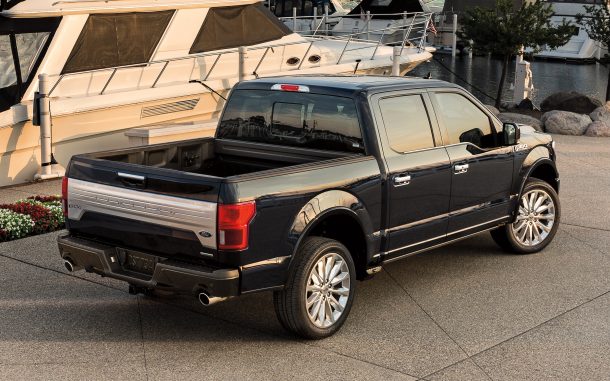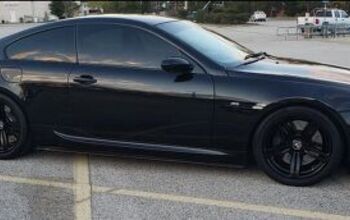Survey Suggests Truck Buyers Growing Less Satisfied

It used to be that, if you were a “Ford Truck Man,” that’s all you drove. In fact, this author and his friends used to frequently quote the Toby Keith classic anytime someone exhibited an overabundance of brand loyalty. The borderline hysterical ad includes a scene with Keith hitchhiking through the desert, refusing rides from anything that lacks a blue oval on the grille. Hyperbolic for sure, but it kind of felt like that’s how people shopped for trucks back then.
Plenty of people still shop for a new pickups in this manner but, according to a recent survey, buyers are becoming increasingly less loyal as truck prices continue to climb.
Average transaction prices have increased steadily across the board, settling in around $36,000 in the United States, but pickup prices aren’t representative of the national average. Your average U.S. pickup retails for roughly $48,500. While you can absolutely get them for less, optioning anything other than a regular cab with the base engine will push you well over the $30,000 mark.
CarGurus recently conducted a survey of 1,067 current and former pickup owners. The general consensus? Trucks aren’t a good value and have begun to suffer in terms of overall quality. In fact, 68 percent of surveyed owners said their own vehicle was overpriced. While this certainly hasn’t destroyed the segment (the very notion is laughable), 17 percent of respondents claimed they probably wouldn’t buy another pickup.
While 24 percent cited overly ambitious pricing as their main reason for ditching trucks, 42 percent claimed fuel efficiency was the main reason for the promised swap. Among former pickup owners who have already moved onto another type of vehicle, 37 percent now drive an SUV or crossover, with 35 percent selecting the tried-and-true sedan.
The Detroit Free Press reached out to Madison Gross, director of consumer insights at CarGurus, to see if more could be gleaned from the metrics. “What an interesting finding in that study,” Gross said. “What we see as the top reasons people are switching categories is that trucks have poor fuel efficiency and they’re high cost. Switching into a large SUV might not make as much sense as a sedan.”
Gross also said shoppers are less inclined to stick with their current brand, though the data provided wasn’t enough for us to agree without a caveat. The study showed that 70 percent of truck buyers would consider swapping brands if their preferred make “increased prices by $10,000.” It’s a fairly modest increase over last year’s 64 percent and could potentially be attributed to a reasonable margin of error. But it’s also phrased in a way that makes it difficult to disagree with. Gross elaborated further.
“Year-over-year, there wasn’t much of a change at the $5,000 threshold, but at $10,000 it got really interesting,” she said. “We’ve seen truck makers widen the audience they’re seeking for the truck. In the past it was mostly for a working or commercial buyer. Now people drive it in daily life. So the change in loyalty to a brand also is impacted by that.”
Toyota owners stood out as having the most loyal customers, with 40 percent saying they would not buy another brand’s pickup. Domestic nameplates were closer together, with about a quarter of their existing clientele saying they’d at least consider switching brands. Ford was the most common choice, edging out its rivals by a few percentage points. Meanwhile, Ford owners were slightly more likely to choose Ram in the event of a nameplate swap.
[Images: Ford; FCA; General Motors]

A staunch consumer advocate tracking industry trends and regulation. Before joining TTAC, Matt spent a decade working for marketing and research firms based in NYC. Clients included several of the world’s largest automakers, global tire brands, and aftermarket part suppliers. Dissatisfied with the corporate world and resentful of having to wear suits everyday, he pivoted to writing about cars. Since then, that man has become an ardent supporter of the right-to-repair movement, been interviewed on the auto industry by national radio broadcasts, driven more rental cars than anyone ever should, participated in amateur rallying events, and received the requisite minimum training as sanctioned by the SCCA. Handy with a wrench, Matt grew up surrounded by Detroit auto workers and managed to get a pizza delivery job before he was legally eligible. He later found himself driving box trucks through Manhattan, guaranteeing future sympathy for actual truckers. He continues to conduct research pertaining to the automotive sector as an independent contractor and has since moved back to his native Michigan, closer to where the cars are born. A contrarian, Matt claims to prefer understeer — stating that front and all-wheel drive vehicles cater best to his driving style.
More by Matt Posky
Latest Car Reviews
Read moreLatest Product Reviews
Read moreRecent Comments
- VoGhost Just reminding us all that we have to tolerate dealers (many of whom are billionaires) in the US if we want new legacy ICE vehicles because the dealers pay for the campaigns of local politicians, with our money.
- 1995 SC I'm still trying to get past the fact that the Red Bull guy is married to a Spice Girl.
- Ravenuer Not into F1. Started watching NASCAR back when they raced actual cars. (yeah I'm that old). Not any more. They aren't "stock cars" now. Not even close. Even drag races don't interest me anymore. Races are over in 3 seconds.
- Wjtinfwb No confusion on my end, Ghost. The Government has zero role in job creation outside of the legitimate opportunities' created by Government going about it's responsibilities, namely keeping the American people and territory safe from foreign intrusion. Of course, they're failing epically at that but that's a different topic. The American free enterprise system is what enables job creation. Government's role is to stay out of the way of that system, but they seem incapable of doing so. Oil & Gas exploration is just one example. If a National Job Policy is what you're looking for, there are other countries that will be happy to accept your application for residency.
- Michael Smith I drive 100-300 miles a day in new BMWs, Mercedes-Benzes, and GM SUVs. Some are already equipped with automatic braking.It's the first thing I turn off when I start the car.I've had experiences where (as the author notes) the system gave false alarms and stabbed the brake pedal, threatening my ability to control the car.Further, every driver encounters situations where, for example, legal following distance must be momentarily compromised in order to avoid a difficult situation. When the system intervenes, it disrupts the driver's plan of action. This can lead to a collision as the driver has to suddenly react not to his surroundings, but to the system.Not only is automatic braking an insult to skilled drivers, it's dangerous to everyone.




































Comments
Join the conversation
Roughly half the "buyers" were FORMER pickup owners. Wut? "Survey" results were predetermined beforehand, and they set out to prove the headline with a ridiculous premise. If they had more "former" pickup owners than current owners, wouldn't they have to change the headline to: "Survey Suggests Truck Sellers Are Growing Less Satisfied..."?
As a latecomer to the urban cowboy party, I'd say it's the expanding demographic of the truck market that's causing both the prices to rise and the owner satisfaction scores to normalize. Truck salesmen of today have a lot in common with Harley Davidson salesmen of 5-10 years ago. They believe that recent sales trends will last forever, and their heads practically explode when anyone comparison shops. We'll see how long that lasts.